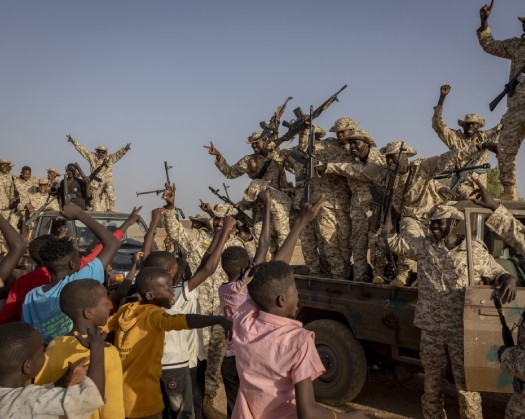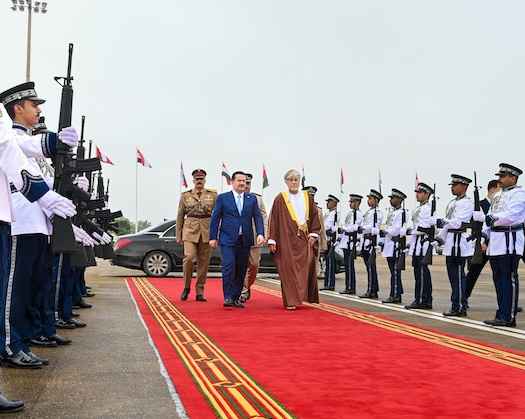Khartoum, the capital of Sudan and one of the largest cities in Africa, has been transformed into a desolate battlefield. The gold market lies in ruins, with lifeless bodies and debris scattered around. The state TV station, once a source of information, has now become a place of torment. Even the national film archive has been ravaged in the midst of the conflict.
The sound of artillery shells echoes through the air, raining destruction upon hospitals and homes. Grieving residents lay their loved ones to rest just outside their own front doors. Some individuals have taken up arms, joining civilian militias in an attempt to protect themselves and their communities. In the midst of this chaos, malnourished infants in famine wards desperately fight for survival, with the heartbreaking reality that one of them succumbs to death every few days.
This power struggle between two generals has plunged Sudan into a devastating civil war, with Khartoum serving as the epicenter of one of the world's most severe humanitarian crises. According to American estimates, the conflict has claimed the lives of up to 150,000 people since its outbreak last year. Additionally, the United Nations reports that a staggering 9 million individuals have been displaced from their homes, making Sudan the epicenter of the largest displacement crisis on our planet. Tragically, a looming famine threatens the lives of hundreds of thousands of children in the coming months, as warned by officials.
Sudan has turned into a battleground for various foreign actors such as the United Arab Emirates, Iran, Russia with its Wagner mercenaries, and a handful of Ukrainian special forces, all contributing to the escalating chaos. These outside interests are fueling the conflict by supplying weapons and fighters, each vying to benefit from the war spoils, which include Sudan's gold reserves and strategic location along the Red Sea.
The conflict in Sudan escalated in April 2023, triggered by a violent confrontation between the country's military and the Rapid Support Forces, a paramilitary group it had previously supported, leading to gunfire on the streets of Khartoum.
Shortly after, conflict spread throughout Khartoum and extended far beyond. The people of Sudan are shocked by the devastation, yet neither faction seems poised for triumph, leading to a chaotic and destructive conflict.
The Sudanese state is on the verge of collapse, which poses a significant threat to the entire region. With the U.S.-led peace talks at a standstill, neighboring countries like Chad, Eritrea, or South Sudan are at risk of being drawn into the turmoil.
The deteriorating situation in Sudan has far-reaching consequences, impacting the global stage. Iran, already supporting the Houthis in Yemen, is now providing military assistance to factions on both sides of the Red Sea. European nations are concerned about a potential influx of Sudanese migrants seeking refuge on their shores. Furthermore, a recent intelligence assessment from the United States has warned about the possibility of Sudan becoming a safe haven for terrorist and criminal networks.
In November, Colonel Osman Taha, a Sudanese military officer, experienced the horrors of the conflict firsthand. As he crossed the Nile, gunfire and mortars rained down around him, injuring him and his fellow soldiers. Tragically, some of them did not survive the journey.
Despite his injuries, Taha managed to reach the opposite bank. However, his ordeal was far from over. Just days later, he underwent a leg amputation due to his injuries. Even during his recovery in a military hospital overlooking the Nile, the violence persisted. Shells fired by the Rapid Support Forces across the river struck the hospital walls, forcing patients to rearrange their beds to avoid being hit by artillery.
In February, there was a glimmer of hope as the military, equipped with advanced Iranian drones, managed to retake this specific area of the city. This was in stark contrast to the RSF, who relied on drones provided by the United Arab Emirates.
Thanks to the military's progress, numerous injured soldiers were able to be airlifted to Port Sudan, where they now occupy the crowded wards of a military hospital.
Among the evacuees was Taha, who sat up in his bed to share a series of videos he had captured during his last battle. The footage showed jubilant soldiers celebrating, believing they had emerged victorious. Meanwhile, wounded RSF fighters lay on the ground, bleeding and subjected to mistreatment by the soldiers.
Unfortunately, the soldiers failed to detect a hidden RSF sniper in a residential area, who ultimately shot Taha in the leg. Later that night, he was transferred by medics to an ammunition factory near the Nile, where they embarked on a dangerous journey.
Taha expressed his pessimism about the war coming to an end anytime soon. He firmly believed that guns alone could not solve the underlying issues and that peaceful dialogue was necessary.
For Amna Amin, war translates to hunger. After the Rapid Support Forces entered her neighborhood in Omdurman, one of the three cities comprising greater Khartoum, Amin, aged 36, found herself unable to provide food for her five children.
After her husband, a gold miner in the north, disappeared, she was let go from her job as a cleaner. Despite the help from neighbors, it was insufficient. Soon, she had two more mouths to feed: Iman and Ayman, twins born in September.
In a matter of months, the twins began to lose weight and suffer from diarrhea, clear signs of malnutrition. Fearing for her children, Amin gathered them in her arms and raced across the front line to reach Al Buluk children’s hospital, their last hope for survival.
Although the United Nations has not officially declared a famine in Sudan, many experts believe that one is already occurring in parts of Darfur and Khartoum.
The U.N. warns that over 220,000 children could perish in the upcoming months alone. Both sides are using hunger as a weapon of war, according to aid officials. The army restricts visas, travel permits, and access to cross the front lines. The Rapid Support Forces have pillaged aid trucks and warehouses and created additional barriers.
Tom Perriello, the U.S. envoy for Sudan, stated, "One of the most dire situations on the planet is on a path to worsen significantly."
The hospitals that are still operational are under immense strain, reaching the point of collapse. Al Nau hospital, located near the front line in Omdurman, receives hundreds of new patients on a daily basis. Due to the overcrowding, many patients are forced to share beds with one another.
As the front line shifts, patients find themselves constantly moving from one neighborhood to another. This journey is fraught with danger as they encounter checkpoints manned by fighters who not only demand money but also engage in theft and even open fire at times.
One patient, Mudassir Ibrahim, shared his harrowing experience of being detained by the Rapid Support Forces (RSF) inside Sudan's national radio and television station. He displayed the welts on his back, which he claimed were a result of being beaten with iron rods and electrical cables during his week-long detention. He described the pain as akin to experiencing death multiple times.
Upon visiting the television station in Omdurman, we witnessed evidence supporting Mudassir's claims. Barred rooms in the finance department were adorned with ropes and other restraints. The floor was littered with piles of dry excrement, and the walls were covered in names, pleas, and fragments of poetry, reflecting the dire conditions within.
The majority of the compound was left in ruins. The primary structure had been destroyed by airstrikes, and a film archive from the 1940s, one of the largest in Africa, had been opened by gunfire. According to soldiers, the RSF had withdrawn across the river, but some had left behind their own wartime knowledge.
A message scrawled on a wall stated, "Don't live like a coward as long as death is certain." The RSF did not address the allegations of torture and other misconduct by its members.
In Omdurman, hundreds of young women dressed in black marched through a schoolyard early one morning, becoming the latest recruits in a rapidly escalating conflict.
The conflict began as a disagreement between Sudan's army chief, Gen. Abdel-Fattah Burhan, and the leader of the Rapid Support Forces, Lt. Gen. Mohammed Hamdan Dagalo. However, since last autumn, a series of RSF victories have sparked widespread concern, leading to a surge in armed groups joining the conflict, mostly in support of the military.
Wooden crates were strewn across the weapons depot near an abandoned RSF base. Any identifying features, such as serial numbers or other indicators of the weapons' origin, had been deliberately removed. It appeared that foreign powers fueling Sudan's war were trying to conceal their involvement.
However, there are still remnants of the conflict that persist. U.S. officials have expressed growing concerns about the United Arab Emirates, which has been the largest foreign supporter of the war. The country has significant investments in Sudan's gold and agricultural sectors, and prior to the war, it had entered into a $6 billion agreement to construct a port on the Red Sea. According to The New York Times, the United Arab Emirates has been illicitly supplying weapons to the RSF through a base in Chad, thereby violating a U.N. arms embargo.
In contrast, Egypt has been supportive of Sudan's military. However, there has been apprehension in Washington due to the army's recent acquisition of drones and other weaponry from Iran, as reported by several Western officials.
Russia appears to have supported both factions.
In the past, Wagner mercenaries provided the RSF with anti-aircraft missiles, according to U.N. investigators. Subsequently, Russians went to Khartoum to train fighters to take down Sudanese military aircraft, as reported by two senior Sudanese officials who disclosed the Russians' identities and movements.
Today, around twenty Wagner operatives are still in the capital, operating drones and launching mortars for the RSF, as per the Sudanese sources. The presence of Russian forces prompted Ukraine to send a small special forces team to assist the Sudanese military in Khartoum.
The foreign intervention is hindering U.S.- and Saudi-led diplomatic efforts to achieve a ceasefire, with critics arguing that these attempts to stabilize Sudan have been disappointingly feeble. There are concerns that the country is heading towards a prolonged conflict that could result in anarchy or competing factions, reminiscent of Somalia in the 1990s or post-2011 Libya.
The conflict in Sudan could easily spill over into neighboring countries. It has already caused internal tensions within Chad's security forces and has disrupted crucial oil revenues for South Sudan. There is now a risk of drawing in Ethiopia, the second most populous country in Africa.
Sudanese authorities have accused Ethiopia of supporting the RSF. In contrast, Eritrea, a long-standing adversary of Ethiopia, has aligned itself with Sudan's military. Additionally, reports indicate that numerous rebels from Ethiopia's troubled Tigray region are currently based at a camp in eastern Sudan, creating a volatile situation that could potentially escalate the conflict.
There are Sudanese individuals living in exile who are pleading for international intervention. However, they believe that such involvement has only exacerbated the situation thus far.
Ibrahim Elbadawi, a former economy minister now residing in Cairo, described the current state of affairs as "sheer madness" and has called for the deployment of a U.N. peacekeeping mission to prevent his country from descending into chaos.












